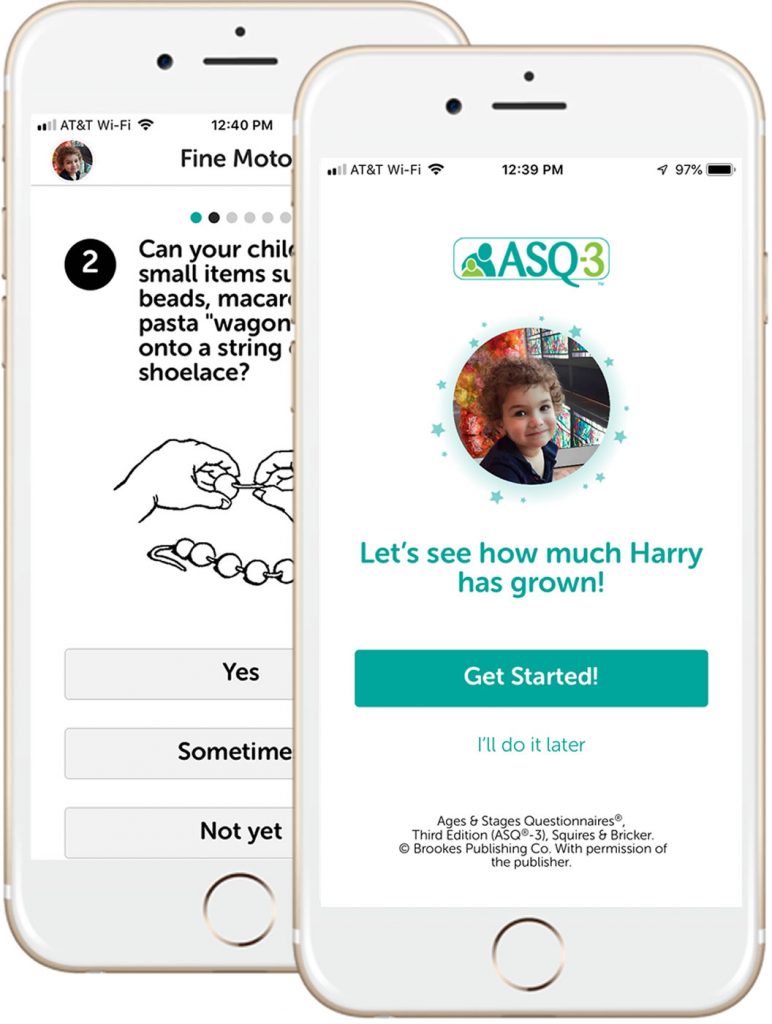What is the ASQ?

Sparkler offers the mobile Ages & Stages Questionnaires® (ASQ®).
ASQs provide reliable, accurate developmental and social-emotional screening for children between 1 month and age 6. Drawing on parents’ expert knowledge, ASQ has been specifically designed to pinpoint developmental progress and catch delays in young children — paving the way for meaningful next steps in learning, intervention, or monitoring.
The ASQs have been used since the 1990s and are published by Paul H. Brookes Publishing Co., Inc.
Why Screen?
All parents have questions!
Screening helps parents/caregivers, as well as pediatricians, educators, and other service providers understand how children are developing. Screening takes a snapshot of children’s skills and helps to identify children who may be at risk for delays.
The American Academy of Pediatrics (AAP) recommends developmental and behavioral screening for all children during regular well-child visits in early childhood. Families can understand and celebrate as their children achieve milestones, and if screening shows that there might be a delay, the process can help families access early intervention, which research shows can improve children’s development.
What is the ASQ-3?
There are 21 ASQ-3 questionnaires for use with children from 1 month to 5½ years old (one questionnaire for each age range). The ASQ asks parents questions about five important areas of development:
- Communication: Language skills — what children understand and what they say.
- Gross Motor: How children use their arms and legs and other large muscles for sitting, crawling, walking, running, and other activities.
- Fine Motor: Children’s hand and finger movement and coordination.
- Problem Solving: How children plays with toys and solve problems.
- Personal-Social: Children’s self-help skills and interactions with others.
The “Overall” section asks open-ended questions about children’s development and lets parents/caregivers share any concerns they might have.
What is the ASQ:SE-2?
ASQ:SE-2 is a set of questionnaires that focus on social-emotional development. There are 9 ASQ:SE-2 questionnaires for use with children from 1 month to 6 years old. Here are the seven areas of development that each questionnaire looks at:
- Autonomy: Children’s ability or willingness to self-initiate or respond without guidance (moving to independence).
- Compliance: Children’s ability or willingness to conform to the direction of others and follow rules.
- Adaptive functioning: Children’s success or ability to cope with bodily needs (sleeping, eating, toileting, safety).
- Self-regulation: Children’s ability or willingness to calm or settle down or adjust to physiological or environmental conditions or stimulation.
- Affect: Children’s ability or willingness to demonstrate their own feelings and empathy for others.
- Interaction: Children’s ability or willingness to respond to or initiate social responses with parents, other adults, and peers.
- Social-communication: Children’s ability or willingness to interact with others by responding to or initiating verbal or nonverbal signals to indicate interests, needs, or feelings.
The “Overall” section asks open-ended questions about children’s social-emotional development and lets parents/caregivers share concerns.
How Long Does Screening Take?
Parents/caregivers will need only 10–15 minutes to fill out an ASQ-3 or ASQ:SE-2 questionnaire. (On Sparkler, you can start and stop or skip around; the system will save your answers until next time!)
What Happens After Screening on Sparkler?
Provider will get in touch with families to share results and recommend any follow-up actions.
If a child is developing without concerns, there won’t be specific follow-up steps, but parents/caregivers can keep using Sparkler to find play activities that you can try at home to promote early learning and development. All of the activities in Sparkler under “play” help to promote healthy early child and brain development; families can find specific “ASQ Intervention Activities” adapted for Sparkler in the play packs called “milestone activities.”
If a family has concerns about one or more areas of development, their program will contact them (via Sparkler, phone, and/or email) to help with next steps. The provider might suggest a referral for further assessment or an evaluation. The provider might also recommend activities or other specific local resources/supports that could help to address families’ concerns.
What Should Parents Do if They're Concerned About Development?
Using Sparkler, parents/caregivers can screen their children throughout early childhood to make sure that they’re continuing to achieve milestones — and to learn about upcoming milestones.
Parents/caregivers should always ask their teacher or doctor if they have questions about their child’s development or the results of the ASQ.
Questions?
If you have questions about screening, monitoring, or other aspects of early childhood development, ask your program or reach out to Sparkler at support@playsparkler.org.
